By Jonathan Miller, on Fri Jan 4, 2013 at 10:00 AM ET We at The Recovering Politician are proud to announce that one of our own, contributing RP and former Congressman Tom Allen, has published an outstanding new book, Dangerous Convictions: What’s Really Wrong with the U.S. Congress. Here’s a summary:
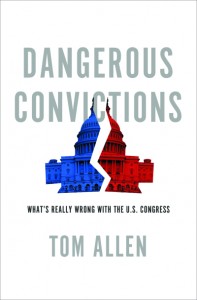 Click here to review and/or purchase The rhetoric of the 2012 presidential campaign exposed the deeply rooted sources of political polarization in American. One side celebrated individualism and divided the public into “makers and takers;” the other preached “better together” as the path forward. Both focused their efforts on the “base” not the middle.
In Dangerous Convictions, former Democratic Congressman Tom Allen argues that what’s really wrong with Congress is the widening, hardening conflict in worldviews that leaves the two parties unable to understand how the other thinks about what people should do on their own and what we should do together. Members of Congress don’t just disagree, they think the other side makes no sense. Why are conservatives preoccupied with cutting taxes, uninterested in expanding health care coverage and in denial about climate change? What will it take for Congress to recover a capacity for pragmatic compromise on these issues?
Allen writes that we should treat self-reliance (the quintessential American virtue) and community (our characteristic instinct to cooperate) as essential balancing components of American culture and politics, instead of setting them at war with each other. Combining his personal insights from 12 years In Congress with recent studies of how human beings form their political and religious views, Allen explains why we must escape the grip of our competing worldviews to enable Congress to work productively on our 21st century challenges.
Already the book has garnered some impressive reviews:
“With historically low ratings, Congress is regarded as ‘dysfunctional’ by Americans of all political persuasions. Why that is so, and what can be done to reduce excessive partisanship, is the subject of Tom Allen’s well-informed and provocative book.” -Former U.S. Senator George J. Mitchell
“This is an extraordinarily valuable examination of the most troubling concern of our time: the inability of our leaders in Washington to find consensus and forge compromise in the public interest. Readers will discover here a deeply penetrating analysis by an author who had unique opportunities to observe from the inside the causes and consequences of our current polarization. Anyone who wants to understand why contemporary politics so often results in failure cannot afford to miss this essential book.” -G. Calvin Mackenzie, Goldfarb Family Distinguished Professor of Government, Colby College
“Allen, a former Democratic congressman from Maine and current president and CEO of the American Association of Publishers, offers a panoramic critique of Congress based on his 12 years in office (1997-2009), covering policy areas from the budget to health care….Allen’s pragmatism and reason help frame major issues for Americans hungering for some legislative wisdom after the election.” –Publishers Weekly
Click here to review and/or purchase.
By Tom Allen, on Wed Oct 31, 2012 at 10:00 AM ET 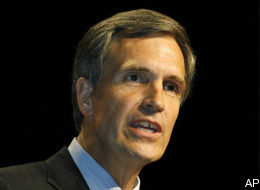 Closing arguments for President Barack Obama and Governor Mitt Romney should contrast their respective records and declared agendas. But that’s not enough. Each candidate lives and breathes in a political party ecosystem with a dominant worldview and armies of enforcers to keep office-holders, even presidents, from straying too far from received doctrine. Closing arguments for President Barack Obama and Governor Mitt Romney should contrast their respective records and declared agendas. But that’s not enough. Each candidate lives and breathes in a political party ecosystem with a dominant worldview and armies of enforcers to keep office-holders, even presidents, from straying too far from received doctrine.
Let’s start with the President’s record. He was sworn in facing the worst economic conditions in 80 years, and with only three Republican votes enacted an economic stimulus agenda that saved or created 1.4 to 3.3 million jobs. The stimulus worked. He saved General Motors and Chrysler from collapse, signed Wall Street reform legislation and, to top it off, drove through Congress the most important health care reform since the 1960s. He brought our troops back from Iraq as promised. Obama rang up historic accomplishments in the teeth of fierce Republican opposition even to proposals (like Obamacare) with a strong Heritage Foundation roots.
In a second term President Obama is committed to further spending restraint and entitlement reform as long as the deficit-expanding Bush tax cuts are, for the super-wealthy, repealed. He’ll make immigration reform and strengthening America’s education system important priorities.
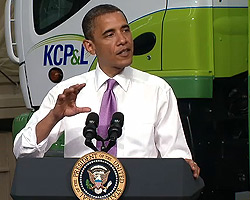 Mitt Romney’s rhetoric reflects the right-wing fear of “dependency” if Americans choose to tackle our pressing public challenges through government action. Since the goal is for government to spend and do less, it’s no wonder that he promises big tax cuts for everyone and “big change” without explaining what he means. But we should look beyond the rhetoric. Mitt Romney’s rhetoric reflects the right-wing fear of “dependency” if Americans choose to tackle our pressing public challenges through government action. Since the goal is for government to spend and do less, it’s no wonder that he promises big tax cuts for everyone and “big change” without explaining what he means. But we should look beyond the rhetoric.
The ideas, bundled into worldviews, which define the parties today will shape the administration of the winner on November 6th.
For most congressional Republicans today and their active supporters, government routinely infringes upon personal liberty, undermines self-reliance and is generally inefficient and incompetent. Since government is the problem, taxes should be cut, regulations reduced and—somehow—all be well in time. How that will happen is a matter of faith, not evidence. Republicans would roll back health care coverage for more than 30 million Americans who will finally obtain it through “Obamacare.” They deny the overwhelming scientific consensus about the threat of climate change. The economic plan consists of vague “free market” generalities.
People who don’t believe in government don’t run it well. That’s one lesson from the George W. Bush administration. That’s why, given the enormous challenges of making the federal government work well, it should be left in the hands of those who are willing to try.
Read the rest of…
Tom Allen: A Closing Argument for Obama
By Tom Allen, on Mon Aug 13, 2012 at 9:00 AM ET  I served with Paul Ryan for 10 of my 12 years in Congress, and 4 years together on the House Budget Committee. I served with Paul Ryan for 10 of my 12 years in Congress, and 4 years together on the House Budget Committee.
Paul is bright, pleasant, hard-working—a real gentleman.
But he is also an ideologue, inspired by Ayn Rand, fiercely opposed to federal spending and a passionate believer in the power of tax cuts to stimulate economic growth in all circumstances.
The budget proposals he has presented the last three years reduce taxes for the wealthy, and services (and tax breaks) for the middle class.
Ryan is a small government conservative; not a deficit hawk.
Ryan is also a high risk choice for Romney; his campaign must be gambling that Ryan’s ideas will not be well enough understood to hurt Romney’s chances. Since ideas get trivialized and trampled by media coverage anyway, they may be right.
It is a sad commentary on our dysfunctional politics that the Republican nominee felt he had to choose someone on the right wing of the party rather than reach out to the middle of the electorate.
By RP Staff, on Thu Dec 15, 2011 at 8:30 AM ET Contributing RP Tom Allen, former Congressman from Maine is promoting local efforts to promote math and science education in public schools:
Former U.S. Rep. Tom Allen said providing Maine students with more engaging math and science programs is a pathway to a stronger economy Tuesday during the official unveiling of The Reach Center, a new organization aiming to do just that.
Allen headlined a media event at Southern Maine Community College’s Sustainability and Energy Alternatives Center in South Portland to mark the launch of The Reach Center. The new group comes from a partnership between the Augusta-based Maine Mathematics and Science Alliance and the Maine School of Science and Mathematics in Limestone, and is funded by a $3.2 million gift by an anonymous donor.
Allen touted the new organization, which hopes to provide individual student mentorships and a central clearinghouse for innovative math and science programs around the state, as poised to play a key role in Maine’s economic future.
Click here to read the full story from the Bangor Daily News.
By RP Staff, on Fri Dec 9, 2011 at 12:00 PM ET Contributing RP Tom Allen, a former Congressman from Maine, is working on a new political book, reports Seth Koenig of the Bangor Daily News:
Former U.S. Rep. Tom Allen, a Democrat, and I happened to be leaving a media event in South Portland at the same time Tuesday. We chatted for just a few moments before he hopped into the passenger seat of a waiting sedan, undoubtedly off to another obligation (as president of the Association of American Publishers and a member of several organization boards, he keeps busy).
I asked how he’s liking life outside of the “political crossfire.”
He said he’s loving it. But he’s not staying out of the political crossfire forever.
Allen, who served 12 years in the House before giving up the seat to challenge Republican Susan Collins in 2008 for her Senate seat (unsuccessfully), said he’s working on a book about politics he hopes will hit shelves next year.
“It’s about the ideas that separate Rs and Ds,” the former Portland mayor said. “It explains everything.”
Allen still has strong opinions about politics, as evidenced by guest columns he’s written for the website The Recovering Politician (click here or here for some of his recent opinions about the atmosphere in Congress — he’s not ambiguous about which political movement he feels is to blame for ongoing Capitol Hill hostility).
Click here to read the full article.
And stay tuned to The Recovering Politician for more developments on Tom Allen’s literary career.
By Tom Allen, on Mon Aug 1, 2011 at 8:30 AM ET  As a former Member of Congress, I am no longer asked how I will vote; instead, the question I get almost every day is how did Congress become so dysfunctional? The second, less interesting question: Aren’t you glad you’re not there? As a former Member of Congress, I am no longer asked how I will vote; instead, the question I get almost every day is how did Congress become so dysfunctional? The second, less interesting question: Aren’t you glad you’re not there?
The generalized anger at “Washington” is misplaced. Not all parties are equally at fault. While political posturing is apparent, it’s not all about politics. Ideas matter more than most commentators will acknowledge, and ideas that morph into convictions impervious to evidence are the root of our distemper.
Tax cuts pay for themselves. We’ll be welcomed as liberators. Climate science is a hoax—or at least not “proven.” None of these claims was or is true; the evidence against them is overwhelming. But they remain for most congressional Republicans absolute convictions. Why? I believe they are rooted in a profound aversion to collective action by Americans through our governments.
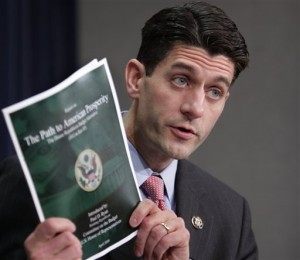 Rep. Paul Ryan I served on the House Budget Committee for four years listening to Paul Ryan, Jeb Hensarling and my other Republican colleagues rail against “spending” (in the abstract) and promote the idea that tax cuts—in all times and circumstances—drive economic growth. The economists who testified at our hearings took a different view; they emphasized the importance in the long run of keeping revenues and expenditures in some sort of balance. Those were views not well received during the tax cutting frenzy of the Bush Administration.
The Tea Party Republicans are not promoting different ideas than their more senior Republican colleagues. They both disdain government, but the Tea Partiers reject political compromise as well.
How did we get here? George W. Bush’s signature line for his massive 2001 tax cut was just one step in the promotion of self-interest over common purpose that is weakening America economically and politically. “It’s not the Government’s money, it’s your money.” Right wing Republicans argue that federal taxes “diminish human freedom.” That world view, promoted with increasing intensity and success for over 30 years, leaves little room for a pragmatic debate about how governments can improve the well-being of the people.
Read the rest of…
Tom Allen: Debt Dysfunction Has Deep Roots
By Tom Allen, on Fri Apr 15, 2011 at 8:30 AM ET 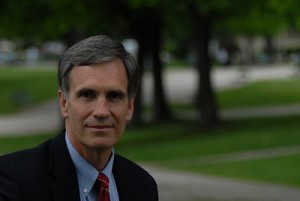
How does one recover from a passion, a deep abiding interest and engagement? From a loss, maybe—that can take some work. But I don’t ever want to recover from politics, though I won’t run again.
I may have had less trouble than some recovering from a loss, because I chose after 12 years in Congress to take a long-shot chance at a U.S. Senate seat against Sen. Susan Collins, an incumbent with an approval rating over 60 percent. Those odds, I realize even more today, don’t usually work out, and mine did not.
When my friend Bill Delahunt retired rather than run again for the Massachusetts 10th district, he had a simple explanation: “I have a two-year old granddaughter.” I get it. My wife and I have a three-year old grandson and a one-year old granddaughter—with another on the way.
That’s not much of a prescription for younger recovering politicians, but it works for some of us.
I do miss the people, my constituents in Maine, all over the state. People of all ages and backgrounds from all walks of life; the students, the retired, labor activists, businessmen and women, health care providers, the uninsured, veterans and war protesters, delegates to party conventions and, yes, even (or especially) supporters of mine at political fund-raisers.
I don’t miss the hours, though. I ran into Tom Davis, the respected Virginia Congressman, on the street in Washington in 2009, the year after we had both left Congress. He just looked at me and said, “Weekends!”
Since I work now as the CEO of the Association of American Publishers, the public policy advocacy organization for the book publishing industry, I spend half of most months in Washington. So I still see some of my friends in (and after 2010) out of Congress. Most of those that have left in the last few years have few regrets, because the atmosphere of congressional activity has become poisonous.
As a form of recovery, I am refusing to leave the arena entirely. Within days of losing my Senate race, I started writing a book which has evolved into an attempt to explain the deeper sources of the polarization that cripples our ability to make long-term strategic decisions about our most pressing public issues.
For me, the signature question of my experience was, “Do these guys believe what they are saying?” That’s what we Democrats asked each other when we heard, “Tax cuts pay for themselves,” or “We’ll be welcomed as liberators,” or “Climate science isn’t proven.” We fully understood that many of our arguments made no sense to Republicans. Why not?
I am exploring the attitudes and ideas that shape our thinking on a range of issues. In particular, I want to highlight the enduring tension in American culture and politics between individualism and community. The working title is Dangerous Convictions: Inside a Polarized Congress. 
But spring is coming, the snow is melting in Maine, the birds returning and soon the fish will be moving again. I will pick up my fly rod and go off with my wife, Diana, to one of our favorite Maine sporting camps, casting for brook trout and landlocked salmon during the day and listening to the loons at night.
I will finish the book this year, and like most authors, I live in the hope that it will make a difference in how Democrats and Republicans think about each other, and, just perhaps, work together for the common good.
|
|










